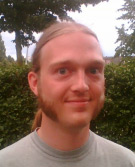Day two at T-DOSE
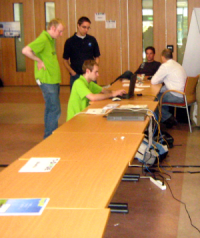 A quiet Sunday morning A quiet Sunday morningThe events started at 10:00 AM on Sunday. I came in early because I wanted to attend Tim Hemel's workshop on Exploiting Open Source Software, a workshop that teaches you to find security bugs. Unfortunately, Tim was delayed so the morning part of the workshop did not happen. If fact, many people came in well after 10 AM. My best guess is that the social event on Saturday evening had been a lot of fun and kept people up very late :-) There was one other cancellation today: Willem Massier was supposed to give a talk about how business IT people should approach and handle open source software, but he had to cancel as well. Instead I visited Frank Hoffman's talk about AdvaS. PresentationsSearch Engine Development with AdvaS - Frank HofmannFrank Hofmann is a Free Software developer currently working in Berlin. During his Computer Science study at the Chemnitz University of Technology he started working on AdvaS. AdvaS stands for "Advanced Search" and is a Python module that you can use to quickly and easily build your own search engine. It's not a search engine in and of itself, rather it provides you with all the building blocks you need for a search engine, freeing you up to focus on the actual search algorithm instead. AdvaS is primarily a research tool. Although you can easily embed it in your own CMS or AI system, it's primary focus is research on search algorithms. It comes with a lot of the building blocks, such as term frequency calculators, stop lists, Inverse Document Frequency, automatic language detection and more. It also comes with a stack of stemming algorithms and sound algorithms. These allow you to do the nifty things Google does as well, such as include alternate spellings, search for different forms of the same words, synonyms and even words that simply sound alike (via Soundex, NYSIIS and other phonetic systems). All these tools together provide the means to quickly build a simple search engine and test out new search algorithms or improve search query formulation. The main thing lacking form AdvaS at the moment are ranking algorithms. AdvaS comes with a simple system that ranks results based on their description, but Frank is looking for contributors for more advances raking schemes. Free education data with GNU Edu - Odile Benassy Odile Benassy presenting GNU Edu Odile Benassy presenting GNU EduGNU Edu is a database of metadata about educational resources and it's designed to help teachers and students find suitable Free teaching material. Finding good (and Free) education resources is a big challenge today. If you search Google for the word "triangle" or "Pythagoras", you will get millions of results. Most of them will be irrelevant and the rest merely tries to explain the subject at hand. It is very rare to find a document that teaches you how to teach other people about it. And even if you're so lucky to find it, you can bet it won;t be under a Free license. The problem of finding good resources is further complicated by language barriers and differences in educational systems. Some words may have different meanings in different languages, so direct translations often just bring up more irrelevant results. Or a document written in French may be too complicated for the students when translated to German. For instance, in France the children are generally taught about chance calculation at age 16 while in Germany the same subject is covered around age 12. GNU Edu tries to build a database of all the available resources and attach metadata to them in such a way as to make finding specific resources easy. For example, looking for "Exercises in chance calculation for level XYZ in Dutch" which is generally impossible with normal search engines. There already exist various international standards for attaching metadata but each has their unique problems, such as the Dublin Core, which is very general, or IEEE's Learning Object Model which is so big, everyone only does partial (incompatible) implementations of it. Yet, GNU Edu manages to comply with them all. It all comes down to mapping, especially for translations. It's virtually impossible to translate everything, but without translations it's hard to figure out what people are actually interested in and what should be translated. Catch-22. Instead, GNU Edu translates and maps all the metadata from one locale to another. For example, when you search for resources for "groep 8", which is the last year of grammar school in The Netherlands (age 11-12), your query will correctly map to different countries with different educational systems and different course structures. GNU Edu does this by mapping "skills" and "courses" to resources. These are then used for the correct contextual translation instead of literal translation which is normally used by search engines. GNU Edu builds on a range of other Free data projects, such as freedict.org and pydict. Currently it does not rely on Wiktionary because it tends to be unreliable. Odile also announces that she is working with the OLPC project to bring GNU Edu to the XO laptop, though the Squeek scripting language and the Wims server, a content server that can be used to create and grade tests, provide exercises and more. KDE 4.0 - Sebastian Kügler The Debian and CentOS booths and on the right Jörn Engel The Debian and CentOS booths and on the right Jörn EngelTo be honest, I did not see Sebastian's talk in it's entirety. In between the GNU Edu presentation and this one, I ended up having a very nice talk with Patrick Laïmbock from Freeswitch, so I came in about 20 minutes late when Sebastian was talking about using ThreadWeaver. Like Adriaan de Groot on the previous day, Sebastian was talking about the pillars of KDE4; the new core libraries. But since both talks were aimed at a different audience, a few new things were discussed as well. One pillar that Adriaan had skipped entirely the previous day was Plasma; the new interface for KDE. It's probably KDE's most hyped new feature. It's all about getting people hooked with beauty and usability, so when they sit down in front of a different system they think "Why doesn't this work as well as KDE?". The desktop should be a useful tool and not just a ghetto for icons. This is also where all of KDE4's fancy desktop effects come in. It's all about making the desktop feel organic and natural to work with. Another interesting feature Sebastian talked about is Kross. Kross provides application developers with an easy to integrate scripting engine. It's all about "turning accessors (users) into mutators". Look for example at the many people creating extensions for Firefox. KDE hopes to integrate Kross into many applications and entice the extension community into working on KDE4. Kross is a perfect tool for this. It supports many scripting languages such as Python and Ruby but abstracts all the difficulty away from the application developer. All the developer has to worry about is the Kross API and not the technical details of the scripting language used. After this it was bling-bling time. Sebastian showed off various features expected to be in the KDE4 desktop, such as plasmoids and Konsole. Sadly, Sebastian's debug build of KDE4 was slightly broken so he was unable to show off Dolphin and Konqueror. Plasmoids are little widgets that you can put on your desktop to provide e.g. battery status, news tickers or weather updates. They are fully scriptable and even support JavaScript to make it easy to build plasmoids that use the internet. As a bonus, the SuperKaramba widgets also work as plasmoids. KDE4 has been optimized in a lot of ways. There is a much bigger focus on usability for example. Sebastian showed off KDE4's Konsole against KDE3's konsole to highlight the differences. Where the KDE3 variant showed menu's with many dozens of configuration options, KDE4's variant has been completely reorganized. It's still as configurable as it's predecessor but the UI has been cleaned up significantly. Another focus area of the KDE team has been power consumption. KDE3 uses a lot of timers that fire every couple of seconds and keep the system awake. The developers have tried to replace as many timers as possible with event-based systems in order to have less interrupts and allow the system to sleep longer. Where this was not possible they tried to align the timers. For example, two timers for two widgets that each fire once a second will fire together in KDE4, allowing the system to sleep for a full second. KDE4 is impressing me more and more. I am looking forward to it's release, which is expected to be in December. Free Software events in Europe - Sven Guckes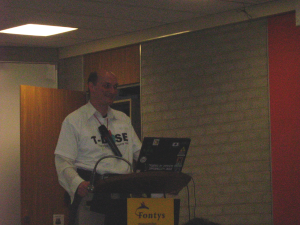 Sven Guckes promoting FOSS events Sven Guckes promoting FOSS eventsThe closing talk of the day was for Sven Guckes. Sven attends and promotes Free Software events across Europe and has been at T-DOSE last year as well. I saw him sitting in on pretty much all the talks I attended as well. Aside from pointing out various Free Software events, Sven also gave advice to attendees and event organizers on how to better promote and organize Free Software events. One big problem here in Europe is the language barriers between different countries. A lot of event websites are translated poorly or not at all, even when the presentations are in English. Other events offer very few talks in English at all, making the event less attractive for foreigners. Someone from the audience pointed out that in France for instance, many Free Software events can get sponsorships from the state, but are then obligated to have all the presentations in French or provide on-the-fly translations from English to French, something that can eat into their budget very quickly. Sven commended the organization of T-DOSE on a job well done. There was a good mix of technical and non-technical presentations and it did not try to copy other events too much. T-DOSE has a real unique identity. He also lauded that many more talks on T-DOSE were in English this year and that the speakers had no trouble switching their presentations from Dutch to English when he attended. It showed too, because there were quite a few foreign attendees.  The audience participates during Sven's talk The audience participates during Sven's talkSven maintains a calendar of all the Free Software events in Europe which you can find on his website and a lot of these events he attends himself. He gave an overview of the upcoming events, such as the UKUUG conference, the Dutch Open Community Camp, FOSSDEM in belgium and the Chemntizer Linux-Tage (which even has a kindergarten!). He encouraged people to visit foreign conferences and help out with internationalization and translation issues. The only way event organisers will realise that FOSS events are international events is when foreign people show their interest. On top of this, he also showed off Pentabarf. Pentabarf is a website CMS system specifically geared at organising events and conferences. Someone from the BSD team in the audience remarked that Petabarf is now also available as a plug-in for Drupal. Sven wrapped up by thanking the T-DOSE team once again for a job well done. Picking up the slackAs I said in yesterday's article, Hans and I attended one other presentation that we were unable to cover properly before we headed off to a new day at T-DOSE: Oliver Cleynen's presentation on how to promote Free Software. Overtaking proprietary software without writing code - Olivier Cleynen Olivier Cleynen from GNU/Linux Matters Olivier Cleynen from GNU/Linux MattersI was very much looking forward to attending this presentation. Olivier Cleynen is the man behind the Get GNU/Linux website, a project that I admire a lot because it so clearly communicates the benefits of Free Software and GNU/Linux in particular to non-technical (Windows) users. For a large part this is because Olivier himself is not technical. He cannot program and is not interested in the technical details of what he uses. Olivier's point is very clear: Free Software does a very bad job of marketing itself and communicating to non-technical users. The community is able to produce software that is technically far ahead of anything that proprietary companies can deliver, such as fully working Live CDs. Yet despite this, we are stuck with a niche market share in terms of numbers while the closed source vendors keep making umpteen billions from their low quality products. Windows Vista, in spite of being a very crappy piece of software with nothing but negative reviews, has sold more copies in the first month after release than there are Desktop Linux users worldwide. According to Olivier, there are four main reasons for us being so small:
Luckily he also had some good advice on how to approach users. The most important thing is to be relevant to them and in most cases, the source code and technical details are not relevant at all. We need to start working for the users instead of purely for our own technical self interest. Olivier pointed out something that he calls the "v0.12 syndrome" that is affecting too many Free Software projects. Indicators of this syndrome are a total dedication to quality, releasing only "when ready" instead of when your users want it and it's "good enough" and a tendency to fork over minor technical disagreements. Above all, we need to understand that quality isn't the most important factor for normal users. Olivier gave some good examples of that last fact. OpenOffice.org is a great FOSS success despite being bigger, slower and of less perfect quality than other Free office suites. Firefox is also a good example. While Firefox does have a very high quality, it's not why users choose it. Mozilla Suite had the same high quality renderers yet failed to achieve the same mindshare that Firefox captured. He advises all Free Software projects that want to attract normal users to learn from these projects. Release when your users want it most and avoid forking at all cost. He also suggested that everybody joins the Free Software Foundation to help improve the legal landscape for Free Software. People and tidbitsT-DOSE is not just about attending talks. Like any other event it is also a great way to get to know people and talk with them. With the morning workshop on Sunday being canceled I had plenty of time to walk around and socialize. I didn't bring any audio recording devices, so the conversations I had with various people are paraphrased from my notes and from memory. Just so you know that you shouldn't quote them on anything. Olivier Cleynen - The man with the plan?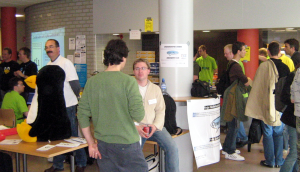 Hans Kwint chatting with other attendees Hans Kwint chatting with other attendeesThe day after Olivier's presentation on FOSS marketing I spoke with him about the projects he is involved in, besides the Get GNU/Linux website. During his presentation the day before, Olivier told us that he had quit his job in order to fully direct his attention to promoting FOSS and I wondered what else he has in store for us. It turns out that Olivier has started a non-profit organization called "GNU/Linux Matters" together with several other people, most notably Gustavo Narea, a Venezuelan programmer living in Madrid. All in all there are 15 core volunteers working on the project. Through this non-profit, Olivier is building a business model that generates money from FOSS marketing. It's still in the early stages at the moment, but they are looking at doing paid-for marketing for FOSS companies, selling hardware and software services and much more. Their Linux Preloaded website is one such activity. With this money they are going target different markets in the same style as Get GNU/Linux websites. One such project will likely be aimed at small and medium businesses and another one at Free Software in general, without the focus in Linux as the underlying OS. I also talked with Olivier about The Tux Project, a different FOSS marekting and advocacy group that is also running a lot of projects. He told me that he is well aware of what the Tux Project people are doing and views them as a great think tank that produce some very good ideas. He also said that GNU/Linux Matters is not officially working with The Tux Project... yet. Olivier and his team are mainly focussing on simple, clear websites to point people to. A lot of the Tux Project ideas are out of his immediate scope and unfortunately he is far too busy getting his non-profit up and running to expand that scope in the short term. Currently Olivier is working hard on getting the word out. He is always looking for volunteers for the various GNU/Linux Matters projects, both technical as well as non-technical people. If you'd like to support his efforts, consider buying a t-shirt to help fund the servers. Patrick Laïmbock of FreeswitchIn between the GNU Edu and KDE 4.0 presentations I shortly spoke with Patrick Laïmbock of the FreeSwitch project. Patrick had held a speech about FreeSwitch earlier that day that I unfortunately was unable to attend. FreeSwitch is "an open source telephony platform designed to facilitate the creation of voice and chat driven products scaling from a soft-phone up to a soft-switch". Basically they are competing and cooperating with Asterisk PBX and other Free telephony software. Patick told me that the main focus at the moment is getting the first release out. They are already at Release Candidate stage and hope to be done by the end of this year, "if it's ready". Their main selling points are flexibility and scalability. FreeSwitch is supposed to be much more than just another PBX and should be able to handle almost an order of magnitude more calls than competing projects on the same hardware. They hope to achieve around 250 simultanious calls per Gigahertz of the server CPU in a standard PBX setup. Jean-Paul Saman - Looking back at T-DOSE 2007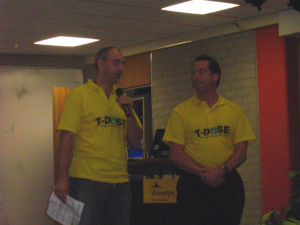 The organisers: Jean-Paul Saman and Jeroen Baten The organisers: Jean-Paul Saman and Jeroen BatenJean-Paul is one of the two organizers of T-DOSE. I spoke with him very briefly near the end of the second day and he was understandably very busy organizing things. He estimated that the number of attendees was about twice as much as for the first T-DOSE in 2006 so it was definitely a success. He also thought that the new venue at the Fontys Hogescholen was a big improvement over last year, something I also heard from several attendees. Last year's T-DOSE was held at the nearby University which was a beautiful location, but very big. Almost impossible to fill with people. ConclusionAll in all, I think that T-DOSE has been a great success. The presentations were mostly of a very high quality and that showed in the number of attendees. The new venue at the Fontys is a great location and it had a very good internet connection, which is often a problem at other events. There even was great wireless coverage provided for free by the WifiSoft Foundation. I am already looking forward to next year's event. |
|
This topic does not have any threads posted yet!
You cannot post until you login.

